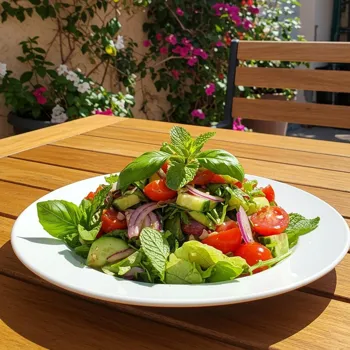Unravel the Mediterranean Diet: A Time-Tested Path to Health. Discover the secrets behind its global acclaim
In a world flooded with trendy diets and quick-fix solutions, the Mediterranean diet stands out
as a time-tested and scientifically-backed approach to healthy eating.

It's not just about losing weight; it's a lifestyle centered around enjoying fresh, whole foods in a way that nourishes both body and mind.
This diet, inspired by the traditional eating habits of people living in countries bordering the Mediterranean Sea, has gained widespread recognition for its numerous health benefits.
So, let's dive deep into what makes this diet so special and why it's often hailed as one of the healthiest dietary patterns in the world.
Mediterranean diet focuses on plant-based foods for health
At its core, the Mediterranean diet emphasizes plant-based foods. Imagine vibrant platters overflowing with colorful fruits and vegetables, such as juicy tomatoes, crisp cucumbers, sweet bell peppers, and leafy greens.
These foods are packed with essential vitamins, minerals, antioxidants, and fiber, all vital for maintaining good health. Whole grains, like brown rice, quinoa, and whole-wheat bread, provide a steady source of energy and are much better than refined grains.
Legumes, including lentils, chickpeas, and beans, are excellent sources of protein and fiber, making them a satisfying and nutritious addition to any meal.
Nuts and seeds, like almonds, walnuts, sunflower seeds, and flaxseeds, are a treasure trove of healthy fats, protein, and fiber, perfect for snacking or adding a crunchy texture to your dishes.
Olive oil serves as the primary source of fat in this diet, known for its heart-healthy monounsaturated fats and antioxidant properties. It is important to choose extra virgin olive oil, which is the least processed type and retains the most nutrients.
Mediterranean diet emphasizes seasonal produce, supports local farmers, and promotes health
One of the most distinctive features of the Mediterranean diet is its emphasis on fresh, seasonal produce. This means that the foods you eat vary depending on the time of year, ensuring a wide range of nutrients and flavors in your diet.
Eating seasonally also supports local farmers and reduces the carbon footprint associated with transporting food over long distances. Vegetables and fruits are consumed in abundance, often making up the majority of each meal.
This high intake of fiber helps promote healthy digestion, regulates blood sugar levels, and keeps you feeling full and satisfied. Herbs and spices are used generously to flavor dishes, reducing the need for excessive salt.
This not only makes the food more flavorful but also provides additional health benefits, as many herbs and spices have antioxidant and anti-inflammatory properties. A moderate amount of dairy is also included, primarily in the form of yogurt and cheese.
Mediterranean diet: Mindful eating, social connections, physical activity, balance
It's not just about what you eat, but also how you eat. The Mediterranean diet encourages mindful eating, which means paying attention to your hunger cues and savouring each bite. Meals are often enjoyed with family and friends, creating a social and enjoyable dining experience.
This emphasis on social connection is an important aspect of the diet, as it can reduce stress and promote overall well-being. Regular physical activity is also an integral part of the Mediterranean lifestyle.
Whether it's a brisk walk, a bike ride, or a swim in the sea, staying active helps maintain a healthy weight, improves cardiovascular health, and boosts your mood.
While sweets are not a common part of the daily Mediterranean diet, they are occasionally enjoyed in moderation, often in the form of fruit-based desserts.
Unlike many restrictive diets that forbid certain foods, the Mediterranean diet promotes balance and moderation, making it a sustainable and enjoyable way of eating for the long term.
Mediterranean diet reduces risk of diseases
The Mediterranean diet isn't just a fad; it's a scientifically-backed way of eating. Studies have shown that it can reduce the risk of heart disease, stroke, type 2 diabetes, and cancer.

Antioxidant-rich diet may lower cognitive decline with age
It's rich in antioxidants that fight inflammation. Research indicates that people who follow this diet have lower rates of cognitive decline as they age, which is a major concern.

Whole foods key to healthy weight without calorie restriction
The emphasis on whole foods naturally avoids processed foods high in sugar and unhealthy fats. It helps in maintaining a healthy weight without overly restricting calories.

Easy Mediterranean diet swaps for healthier eating
Shifting to Med dit is simpler than you think- Swap processed snacks for fruits, Switch butter with Olive Oil, Add legumes to your diet. Eat colourful veggies when you can.





















